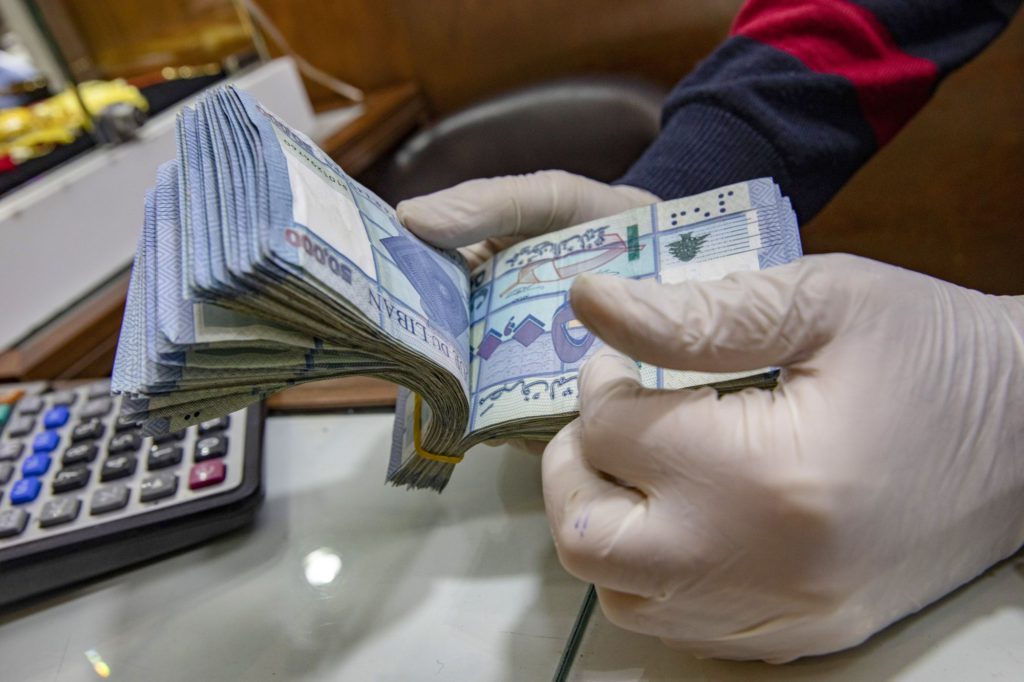Lebanon took a step toward a more realistic value for the pound by adopting a unified exchange rate in place of three different rates it had used in recent years.
(Bloomberg) —
Lebanon took a step toward a more realistic value for the pound by adopting a unified exchange rate in place of three different rates it had used in recent years.
Banque du Liban, the nation’s central bank, on Wednesday set the pound at 15,000 per dollar, devaluing the official rate of 1,500 by 90%, according to people familiar with the matter. It also replaced two separate rates offered on foreign-currency deposits — at 8,000 and 12,000 each — with the new level.
The move is a step toward Lebanon’s commitment to carry out economic reforms as part of its preliminary agreement with the International Monetary Fund for a $3 billion loan. Yet, the nation has a long way to go before it can catch up with the unofficial rate that most of the economy uses, at about 62,000 pounds per dollar.
“The ultimate goal is to unify the rates around Sayrafa but they can’t do it in one shot and the new rate is a preliminary step in that direction,” Marwan Barakat, group chief economist at Bank Audi, said, referring to the rate on the central bank’s exchange platform.
For most Lebanese people, however, the new rate offers little comfort as it applies mainly to banking operations. It will change the rate at which they can save or borrow dollars. Customers with foreign-exchange deposits will get the new rate, which boosts their pound returns. But borrowers of the US currency will see their repayments surge by the same extent.
The new rate matches the most recent one authorities changed for customs, taxes and fees, after three years of eroding revenues in the face of triple-digit inflation.
Distressed Markets
The IMF deal deal requires authorities to take several measures before the fund’s executive board can approve disbursement. Among them are restructuring and audit of the banking sector and moving to a realistic exchange rate.
Other emerging markets like Pakistan and Egypt are facing mounting pressure on their currencies as well. Egypt devalued its pound three times in the past year after the nation’s foreign reserves tumbled.
Lebanon is looking to turn the page on a financial crisis labeled by the World Bank as one of the worst globally since the mid-19th century. The meltdown pushed three-quarters of the country’s population into poverty. But politicians remain deadlocked over how to rescue the country from the turmoil that began in 2019.
‘Printing Press’
“It doesn’t seem like there’s much of a political consensus on how to move the economy forward,” said Richard Segal, a fixed-income analyst at Ambrosia Capital Ltd. “Choosing an official rate so far away from the informal rate doesn’t sound like a step in the right direction, especially as the authorities will not be able to support it. The outlook has therefore not improved unfortunately.”
Even after the rationalization Wednesday, there are other rates in the market for the pound. The black-market value witnessed a sharp move last week, forcing the Energy Ministry to hike gasoline prices twice a day. It fell from 58,000 on Tuesday to 62,000 after the devaluation, according to four money exchangers. A separate semi-official rate on the central bank’s Sayrafa platform, mainly used by licensed exchange bureaus, used to hover around 38,000 until this week. Now, it’s taken a lunge to 47,000.
The central bank “is continuing with a policy of using the printing press, printing pound to buy dollars in the market, including through the Sayrafa platform,” said Nasser Saidi, a former minister of economy and a vice governor at the central bank. “The consequences are clear: accelerating inflation and depreciation of the pound in the market.”
Lebanon’s dollar bonds, which underperformed most of their emerging-market peers last year, rose on Wednesday. The security due 2031 edged up 0.3 cent to 6.7 cents on the dollar, the highest since September.
–With assistance from Netty Ismail.
(Updates black-market rate in third, 11th paragraphs; updates bond moves at the end)
More stories like this are available on bloomberg.com
©2023 Bloomberg L.P.










